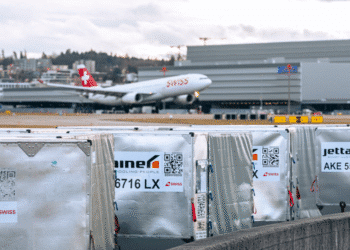Alibaba vs. Amazon: How e-commerce giants are reinventing forwarding
 Last September, Mike Maynard, an airport planner for Cincinnati-based engineering firm CDM Smith, was checking out the flight activity at nearby Wilmington Airpark (ILN) in Ohio, when he noticed something odd. As a former network analyst at DHL, Maynard had a habit of reviewing innovative routes, and this one, in particular, jumped out at him. U.S.-based aircraft lessor Air Transport Services Group (ATSG) had launched what it called a “trial ACMI express network” at ILN, leasing four 767 freighters to an unnamed client.
Last September, Mike Maynard, an airport planner for Cincinnati-based engineering firm CDM Smith, was checking out the flight activity at nearby Wilmington Airpark (ILN) in Ohio, when he noticed something odd. As a former network analyst at DHL, Maynard had a habit of reviewing innovative routes, and this one, in particular, jumped out at him. U.S.-based aircraft lessor Air Transport Services Group (ATSG) had launched what it called a “trial ACMI express network” at ILN, leasing four 767 freighters to an unnamed client.
Intrigued, Maynard looked a little deeper and found that the trial was based out of ILN’s 1.1 million-square-foot facility that used to house DHL’s ill-fated express hub in the U.S., operating four flights a day to Allentown in Pennsylvania; Dallas/Fort Worth; Oakland and Ontario in California; and Tampa in Florida.
Clearly, some kind of test was taking place, but who leases that many 767s for a “trial” network? FedEx, UPS and DHL all denied involvement. ATSG wouldn’t comment.
As aviation experts began analyzing the routes, a clear pattern emerged. Each of the airports the 767s flew into were remarkably close to distribution centers run by e-commerce giant Amazon.com. Insider press reports said the ILN network was known at only the upper echelons of Amazon as “Project Aerosmith.”
“We also gleaned some interesting routes in the West,” Maynard said. Alaska-based carrier Northern Air Cargo had begun operating a Boeing Field in Seattle-Boise-San Bernardino-Boeing Field route – not exactly a common trade corridor, but one that is small enough to go unnoticed and also close enough to several Amazon distribution centers to be of use.
“Rumor is this West Coast network is called ‘Project Alpha,’” Maynard added. “Another rumor is there are other Amazon secretive networks and routes – all named after rock bands.” While the rock-band-name rumor may not have borne fruit, at least one more Amazon air express trial route was found in Europe in November, with aircraft flying five times a week from Wroclaw, Poland, to Luton or Doncaster in the U.K., and Kassel, Germany.
So what’s with all the cloak-and-dagger secrecy? Part of the answer is that the main player is Amazon, which in infamous for revealing nothing about itself. But the real reason is the enormity of the stakes Amazon is playing for: Supremacy in the relatively new arena of global e-commerce logistics.
From China, the Asian counterpart to Amazon – Alibaba – has been more forthcoming about its plans to dominate the logistics industry on a global scale, much as it has already done to Chinese domestic e-commerce. It logistics arm, called Cainiao, was only formed in 2013 and just two years later, during the 2015 “Singles Day” promotion in China, helped Alibaba rake in a staggering US$14.3 billion in a 24-hour period (See more about Cainiao’s numbers here).
The winner of this battle for market share between e-commerce titans not only will rewrite the rules of express freight, turning former clients UPS, FedEx and DHL into competitors. It may also reinvent the freight forwarding industry as we know it.




